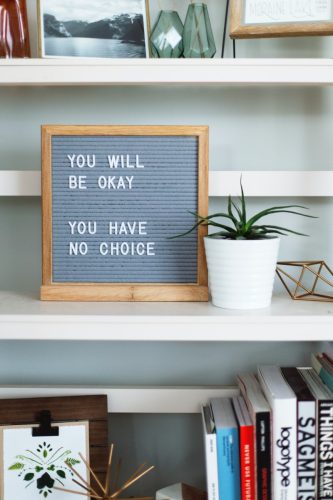
It is no doubt that we live in a tough world, where we frequently deal with difficult people and disappointing situations. During this time, all we need are encouraging words and someone telling us that this will all be over and life will be better once again.
Furthermore, we are often bothered by the little things in our life, leaving us feeling irritated, annoyed, and frustrated. As a result, we tend to live life as if it is always a great big emergency or a big tragedy. However, positive thinking and encouraging words can really help us during hard times.
Better Ways To Think & Live A Happy Life
The encouraging words and advice shared below are definitely no lectures and no set of do's & don't. Rather, they are some simple and focused strategies you can use to help yourself cope with difficult situations in life.
All you have to do and learn is listed below. We will discuss these in detail one by one.
- Stay out of the constant state of emergency.
- Combat negative influence.
- Overcome failure.
- Learn to say no.
- Your problems are your potential teachers.
- Your thoughts are very powerful. (Use powerful words like these to uplift yourself)
- More is never better.
- Appreciate life as it is. (Celebrate small moments)
- Be the best version of yourself.
#1. Stay out of the constant state of emergency
Take a moment and ask yourself how long you have been in a constant state of emergency.
Human beings have a tendency to turn little things into great emergencies. We take our own goals so seriously that we forget to have fun along the way and forget to give ourselves some peace. We make our peace conditional like I will rest 'after' or 'once', or I will treat myself 'after' so and so.
We also criticize ourselves if we cannot meet our self-created deadlines. The first step in becoming a more peaceful person is to realize and admit that, in most cases, we are creating our own emergencies.
Here is How You Can Stay Positive About Life?
Life never stops, even if things don't go according to plan. Therefore, it's helpful to keep reminding yourself and stay away from a constant state of hurry and worry. The following tips can help you from staying out of the continuous state of emergency:
- Don't compare yourself to others, no matter what.
- Eliminate fear of failure. (Use positive affirmations and quotes to lift yourself up)
- Do not pay heed to what others are thinking.
Practical Exercises You Can Do At Home
You may also do the following exercise to keep yourself out of panic. Take a notebook to write down your panic situations or collect examples of urgent situations in picture form and create a collage. In this collage, rate all those pictures which you now believe weren't emergency situations in the first place.
By rating situations, you begin to be attracted to calmness by virtue of the fact that you are trying.
Combat Negative Influences in Your Life
The most common pessimistic influences come in the form of:
- Disappointment
- Blame and criticism
- Conformity
- Perfectionism
- Dominance
Disappointment
When was the last time you felt dissatisfied? Maybe you were due for a promotion but were not promoted. It could also be in a personal relationship where you broke off from a loved one. As a result, because of disappointments, you mistrust both yourself and others.
Blame and criticism
Blame and criticism are a termite to your confidence. You start to believe that each and everything is your fault. As a result, if anything goes wrong, you blame yourself. You dare not take risks in life and try new ideas because you have become highly sensitive to criticism.
Conformity
Have you ever kept quiet when asked a question during a meeting or class just because everyone is quiet even though the answer you knew is correct? This is conformity. This is possibly due to the feeling of being laughed at, or maybe you've been criticized for being always right. This leads to regret and remorse, where you dare not go out and do things that you want to do, in case you fail.
Perfectionism
Perfectionism is a self-inflicted negative influence where failure is unacceptable. You absolutely cannot let others see your mistakes. You are afraid of disapproval and are in constant need of reassurance from everyone around you. Therefore, you criticize yourself for not being perfect if anything goes wrong.
Dominance
Being dominated by others or situations in life is where you take the role of a victim and accept blame for everything that goes wrong. You find it extremely difficult to value yourself and give importance to other people's opinions over you.
#2. Combating Negativity By Changing Your Behaviours
You must combat the negative influences by trying new ideas. The hallmark for coping against negative influences is positive thinking. For example:
- Dealing with every future problem as a new problem in an upfront and honest manner.
- No finger-pointing when things start to go wrong.
- Seeking unconditional support from sincere well-wishers in life.
- Celebrating every little success.
- Trying new ideas and things in life.
- Learning quickly and bouncing back from defeat.
- Having no doubts about your efforts.
- Focusing on your strengths (Guide).
- Having good self-discipline and an optimistic approach.
#3. Overcome your failures & Think of Them As Learning Lessons
Do you remember how your mom often told you stories about how many times you fell before learning to walk? Your father must have often told you how you mispronounced almost everything when you started to speak as a child. Did you balance the bike perfectly when you tried it the first time?
Children are quick learners because they are not scared of failure. Ever heard a child saying, "I give up. I am a failure at walking/speaking"?
Famous People Who Overcame Failure in Their Lives
Successful people like Edmund Hillary, Winston Churchill, J.K. Rowling, and Joan Jett have conquered their fear of failure. If these renowned people had given up in their first setback, they would never have been phenomenal in their lives.
- Winston Churchill failed to gain admission to army school twice. As a result, he was tortured for his entry attempts, and he barely made it on his third attempt. His father considered him an absolute waste and predicted a failed life ahead for him. Winston Churchill went on to become the British Prime Minister. Furthermore, he overcame a severe speech barrier to become one of the most powerful orators in the world.
- Edmund Hillary refused to give up after his first failed attempt to conquer Mount Everest. Rather, he said, "Mount Everest you have defeated me once and you might defeat me again. But I'm coming back again and again, and I'm going to win because you've grown all that you are going to grow, and I'm still growing." Edmund Hillary became the first mountaineer to climb Mount Everest on 29 May 1953.
- Joan Jett's classic "I Love Rock n' Roll", which is estimated to be worth $20 million, was rejected multiple times by all major and minor record companies. All she did was believe in herself and never give up.
#3. Learn to Say No
The majority of us find it extremely difficult to say no when asked to do something, even if doing it causes inconvenience to us. We think that refusal will sound unfriendly or rude, and people might not like us. However, we always have two options, "Yes" and "No". No is there to be utilized.
If we were to live with the only option of "yes", our life would become robotic completely. All we have to do is to realize the power of no as a valuable tool and how to say it. If you wish to have your no taken seriously, then learning the way of saying no is very important.
You have to believe in yourself at the first stage and focus on your rights as a person. Think that you have a right to say yes and no for yourself. You have a right to set your priorities. Lastly, you have the right to state the difficulties that doing others' favors will cause you.
Techniques for Learning to Say No
You may consider the following techniques:
- Take a deep breath.
- Ensure that your body language and tone are firm.
- No should be the first word in your answer.
- Keep your reply short, crisp, and clear. Make sure it's not abrupt.
- State the reason for refusal. Make sure you are giving reasons and not excuses.
- Instead of saying "I cannot", rather say "I prefer not to" or "I'd rather not."
- Do not apologize. You don't owe an apology for the choice that you make. A choice is your right.
- Acknowledge the requester or the one asking for a favor by his / her name.
- Slow down and emphasize the words in your replies.
- Don't look for better reasons.
Practice Phrases that You Can Later Follow
The above exercise will make matters clear to the listener, with nothing left to discuss. You may also consider the following expressions to help you encourage saying no:
- I know you will not like this, but I'd rather not ...
- This isn't the answer that you want to hear, but I prefer not to ...
- I really appreciate you asking me to help, but I am not ...
- I understand your situation, but it is not ...
This will help you say no whether it's about taking on more work at the workplace or saying no to friends without sounding rude. You even have a right to say no to voluntary work that might cause you inconvenience.
#3. Your Problems are Your Potential Teachers
Difficulties and problems are inevitable in life. What is important to understand is how we feel when stressed than the problem itself. Is the problem worth being made a problem? How do we mitigate those problems? What are the coping mechanisms to turn a problem into a potential teaching moment?
Problems come in numerous shapes and degrees of seriousness. Seeing problems as an inevitable part of our lives lifts a weight off our shoulders.
Stages of Coping
Think of a recent problem that you have. How are you coping with it? There are five stages to help you learn to cope and make a problem into a life lesson:
- Admit to yourself the problem
- Reduce expectations of help from others
- Overcome procrastination
- Stay away from distractions
- Remain relaxed and energized to solve the problem
Exercise to Help You Cope Better
Consider the following exercise. Take a notebook and make a list of five things that you are currently facing and determine if you have a solution to it. No problems are big or small. Each category below has some examples to help you brainstorm:
- Home: It is messy, the house needs cleaning, the furniture is worn out, the walls need painting, or the store and attic need major cleaning
- Work: Working over-time, undercharging for your services, you are in the wrong line of work, having inadequate training over required work, or realizing that the future is uncertain
- Personal well-being: Overweight, eating poorly or having junk food, or being physically unfit or a chain smoker
- Financial matters: Constantly living beyond budget, weighed down with debts, or not being paid
Do something about at least one item from each list. Eventually, your list of unsolved problems will be reduced, and your mindset for that problem will become a life lesson. It will improve your confidence to solve a problem and not be scared by issues.
#4. Your Thoughts are Very Powerful (Far More Than You Think)
The relationship between your thinking and the way you feel is highly correlated. It is extremely important to realize that you are constantly thinking. At times you are not even aware of it.
For example, your breathing is involuntary. Until this moment, while reading this article, you certainly didn't realize the fact that you are breathing. The truth is, unless you are out of breath, you simply forget that you are inhaling and exhaling.
Our thinking works the same way. Since you are 'always' doing it, it's easy to forget and hence becomes involuntary. As a result, forgetting that you are thinking all the time may cause problems such as unhappiness, anger, inner conflicts, and stress.
Happiness is in Your Hands
Imagine trying to get angry without angry thoughts or try being stressed or sad without stressed or sad thoughts. It's impossible. In order to feel something, you must first have a thought that produces that feeling.
Unhappiness cannot exists on its own. It is accompanied by negative thoughts, which are caused by your thought process. This simple awareness is a shortcut strategy to put you back in a happy mindset. It takes practice, but you can get to the point where you treat your negative thoughts in much the same way you shoo flies from your food.
In order to have positive thoughts for positive feelings, you have to encourage yourself to remain energized and relaxed. During stressful times, you have to develop escape corners in life as an outlet for the pressure that is building up inside you. You can keep yourself positive by having the following as escape outlets:
- Dancing
- Going to the gym
- Playing football or any other outdoor sports
- Walking
- Meditation
#5. More is Not Always Better
We live in the most challenging times. It is estimated that only 15% of the world's population uses almost half of the resources given to us by nature. It concludes that if more was actually better, we would have been living the happiest and most satisfying life, but none of us really do.
It's not that owning a lot of things is bad, wrong, or harmful in itself, but the desire to have more and more is insatiable and toxic. As long as you think more is better, you will never be satisfied and happy.
As soon as we get something we always wanted, most of us simply go on to the next thing immediately. Whatever we have at that moment is automatically taken for granted. This discounts our appreciation for life and its many blessings. We are simply after or are being asked, "What should be next?"
Take a Step Back
Convince yourself that more isn't better. Learning to be grateful doesn't mean you can't, don't, or shouldn't ever want more than you have, only that your happiness isn't contingent on it. You can learn to be satisfied by focusing on the present moment.
Start seeing your life differently. As you inculcate this new perspective, you will find new possessions or opportunities entering your life, and your level of appreciation will be heightened automatically.
An excellent measure of happiness is the difference between what you have and what you want. You can spend your life wanting more, always chasing happiness-or you can simply decide to consciously want less. This latter strategy is infinitely easier and more fulfilling.
#6. Learn to Appreciate Life as It Is
When people compare themselves to others, they often overlook what they are good at or what should they be grateful for in their lives. It is an excellent idea to look into your life from time to time as a reminder of all the positive things you have rather than worrying about what you don't have.
Many of us fail to notice the little things that make life enjoyable. In a world that reinforces the idea that more is better, it is easy to forget to take time to appreciate life's simple joys and the little gifts it offers every day. Simple joys are around us all the time; all we need is to be aware of them.
You need to develop a new appreciation for the blessings you already enjoy. You can do so by taking some time out to appreciate good things. For example:
- I am thankful for my supportive family.
- I am grateful for my loving friends.
- I appreciate the people I work with.
- I love my work or office.
Common Traits of People Who Appreciate Life
People who appreciate life have the following traits. How about you do a quick litmus test of yourself:
- They feel secure about what they do in life and who they are.
- Learn from the best in others.
- They see successful people as partners and not competitors.
- Get genuinely happy seeing others succeed.
- They have a strong trust in themselves about what they plan to do in life and who they are.
#7. Try to Be The Best Version of Yourself
Everyone has a sense of uniqueness. We may not be perfect in what we do, but no one is meant to be perfect anyway. Of course, there are people who can do better than what you do but remember; there are people who cannot do what you can do best.
For example, a teacher who teaches with care and respect means a lot to their students. Similarly, a sales professional who gives the best customer service is loved by their clients. Hence, teachers and sales professionals are the best they can be in what they have chosen to do.
Think Hard About Yourself
It is time for you to think about what you are really good at. Write down everything that you do best, and that is important to you. Think about all the different aspects, for example, home, family, work, relationships, values, and goals. Create a mission statement for yourself to bring out the best version of yourself. The questions below will help you brainstorm:
- What kind of life do you want to live?
- What part do you want to play in making this world a better place?
- Why do you do what you do? What is the purpose behind it?
- What makes you happy and feel alive?
- What are the things you love to do?
- How do you define success?
Some Reasons to Become the Best Version of Yourself
Why is it necessary to be the best version of yourself? Why do you need a mission statement for your life?
- It will be a compass to help you live a satisfying life.
- The mission statement will be your guiding light.
- They will help you reflect on your core values which help you make your decisions.
- Introspect the quality of your inner life and create a connection to your core values.
- It will help to inspire you and be self-encouraging.
Becoming the best version of yourself requires aligning your inner self, coping strategies, decisions, and life situations altogether. Once you do this, you will get an energy shot to continue to be better and do better.
Concluding Thoughts
In life, you may not get the encouragement or reinforcement you seek from others precisely when you give in your best efforts. This shouldn't demotivate you. Rather, be self-encouraging. Have positive self-talk. As a result, you will feel worthy of yourself, and others will also feel good when they will be around you. The encouragement within will give you the confidence to do anything in life.




